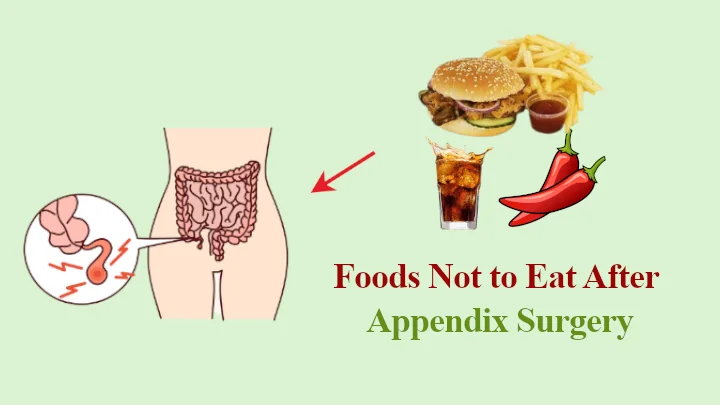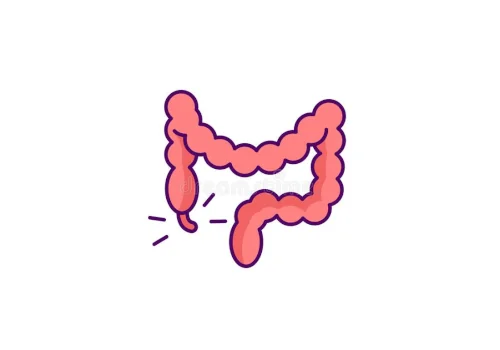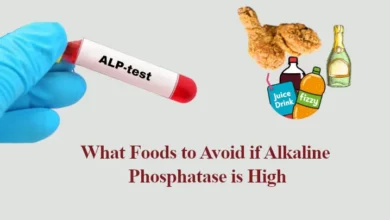13 List of Foods Not to Eat After Appendix Surgery

Looking for list of foods not to eat after appendix surgery. The removal of the appendix is a major procedure that requires careful attention and care during the healing period. Even though an appendectomy, also known as the removal of the appendix, is a frequent medical surgery, it’s essential to provide your body with the nourishment and support it needs for a quick recovery.
After appendix surgery, it’s important to pay attention to your nutrition and decide what to eat to help with healing and reduce pain.
There are some dietary considerations to remember after appendix surgery, even if there isn’t a strict list of prohibited items. Certain foods may make it more difficult to heal, digest, or feel comfortable overall as your body heals from the surgical procedure.
In this post, we’ll look at various list of foods not to eat after appendix surgery that may require moderation or caution.
In This Article
List of Foods Not to Eat After Appendix Surgery

Here we have listed what can i not eat after appendix surgery:
1. Spicy foods
Spicy meals can upset the sensitive gut microbial balance, which is essential for digestion and general gut health. Consuming hot foods may upset this equilibrium and create digestive discomfort after surgery, so supporting a healthy and stable gut environment is essential.
2. Fatty or Greasy foods
The body needs more time and effort to digest and break down high-fat foods. Large amounts of fatty foods can stress the digestive system, which may be temporarily weak or sensitive after surgery.
3. Fried foods
Fried foods frequently include a lot of fat, particularly harmful trans fats. When the body is still healing following surgery, eating too much fat might stress the digestive system and cause discomfort, diarrhea, or other digestive problems.
4. Carbonated Beverages
Carbonated beverages should be avoided after appendix surgery because they contain carbon dioxide gas, which can exacerbate abdominal bloating and gas production in the digestive system.
Your digestive tract could be sensitive after surgery, and too much gas might hurt and make you uncomfortable.
5. Dairy products
Dairy products are not always restricted after appendix surgery. However, after surgery, some people might have temporary lactose intolerance.
The appendix is not directly involved in lactose digestion, but surgical interventions and changes in the gastrointestinal tract can affect the production of lactase, the enzyme responsible for breaking down lactose.
6. Citrus fruits and juices
When consuming acidic foods, such as citrus fruits and juices, some people may feel discomfort or irritability in their digestive tract. These fruits’ high levels of acidity have the potential to irritate the stomach or induce heartburn, especially in people whose digestive systems are sensitive or who are recovering from surgery.
7. Raw vegetables
Raw vegetables can be more difficult to digest and may result in gas, bloating, or discomfort, especially those with a high fibre content like broccoli, cabbage, or raw salads.
Raw vegetables have a higher risk of bacterial infection than cooked veggies. During the healing process, this can be an issue when your body is more prone to infections.
8. Red meat
Red meat, like beef or lamb, may have more fat than leaner protein sources like chicken or fish. In particular, during the initial phases of recovery, high-fat foods may be more difficult to digest, resulting in discomfort or digestive problems.
9. Caffeine
Caffeine is a stimulant that can raise blood pressure, increase heartbeats, and stimulate the digestive system. After surgery, it’s generally advisable to avoid anything that may cause additional stress or stimulation to the body, as it needs time to heal.
10. Seeds and nuts
The outer shells of seeds and nuts are tough and might be difficult to digest. Additionally, some people may find that the coarse texture and high fibre content of seeds and nuts, especially in the early phases of recovery, can be uncomfortable or lead to bloating, gas, or diarrhea.
11. Alcohol consumption
Alcohol should usually be avoided after appendix surgery because You may be given prescriptions for medicines after surgery to help in your recovery, such as antibiotics or painkillers. These drugs and alcohol can interact, reducing their effectiveness or having negative effects.
12. High-fibre foods
Fibre-rich foods are usually good for regular bowel movement and digestive health. However, some people may find consuming large quantities of high-fibre food just after appendix surgery difficult.
High-fibre foods like beans, whole grains, and certain vegetables can be gas-producing. Excessive gas and bloating can be uncomfortable, especially during the initial recovery phase.
13. Sugary foods and drinks
Sugary foods and drinks can cause the immune system to weaken while it works on healing and recovery temporarily. A low immune function has been linked to a high-sugar diet, which may make it more difficult for the body to fight off infections or difficulties while recovering.
Consuming high amounts of sugar can lead to bloating, gas, and indigestion, which may already be common post-surgery due to changes in the digestive system.
Conclusion
To ensure a quick and painless recovery from appendix surgery, paying attention to your dietary choices is essential. Even though there isn’t a specific list of foods that must be fully avoided, it is generally a good idea to use caution and moderation when eating some foods.
Spicy, fatty, oily, and fried foods may aggravate the digestive tract, and dairy products and carbonated drinks may also be uncomfortable, particularly if temporary lactose intolerance is present.
Be sure to read
References
- Patient-Controlled Nutrition After Abdominal Surgery
- Can fruit seeds and undigested plant residuals cause acute appendicitis
- Relationship of eating habits to acute appendicitis in children: a literature review





